Related Research Articles

Donald Clark Osmond is an American singer, dancer, actor, television host, and former teen idol. Osmond first gained fame performing with four of his elder brothers as the Osmonds, earning several top ten hits and gold albums. Then, in the early 1970s, Osmond began a solo career, earning several additional top ten songs.

Olive Marie Osmond is an American singer, actress, author, philanthropist, talk show host and a member of the show business family the Osmonds. Although she was never part of her family's singing group, she gained success as a country and pop music artist and television variety show cohost and in the 1970s and 1980s. Her best known song is a remake of the country pop ballad "Paper Roses". From 1976 to 1979, she and her singer brother Donny Osmond hosted the television variety show Donny & Marie.

The Osmonds are a U.S. family musical group who reached the height of their fame in the early to mid-1970s. Currently consisting of a duo of original members Merrill Osmond and Jay Osmond, the group had its best-known configurations as a quartet and a quintet. The group has consisted of siblings who are all members of a family of musicians from Ogden, Utah and have been in the public eye since the 1960s.

"Ain't Nothing Like the Real Thing" is a 1968 single released by American R&B/soul duo Marvin Gaye and Tammi Terrell, on the Tamla label in 1968. The B-side of the single is "Little Ole Boy, Little Ole Girl" from the duo's United LP. The first release off the duo's second album: You're All I Need, the song - written and produced by regular Gaye/Terrell collaborators Ashford & Simpson - became a hit within weeks of release eventually peaking at number 8 on the Billboard Hot 100 and number 1 on the Hot Soul Singles chart, the first of the duo's s two number 1 R&B hits. In the UK "Ain't Nothing Like the Real Thing" reached number 34.

"Ben" is a song written by Don Black and Walter Scharf for the 1972 film of the same name. It was performed by Lee Montgomery in the film and by Michael Jackson over the closing credits. Jackson's single, recorded for the Motown label in 1972, spent one week at the top of the Billboard Hot 100, making it Jackson's first number one single in the US as a solo artist. Billboard ranked it as the number 20 song for 1972. It also reached number 1 on the ARIA Charts, spending eight weeks at the top spot. The song also later reached a peak of number 7 on the UK Singles Chart. In 2004, the song appeared in The Ultimate Collection.
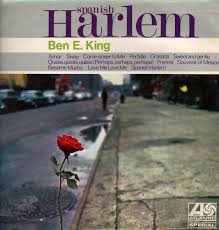
"Spanish Harlem" is a song recorded by Ben E. King in 1960 for Atco Records. It was written by Jerry Leiber and Phil Spector and produced by Jerry Leiber and Mike Stoller. Leiber credited Stoller with the arrangement in a 1968 interview; similarly, Leiber said in a 2009 radio interview with Leiber and Stoller on the Bob Edwards Weekend talk show that Stoller had written the key instrumental introduction to the record, although he was not credited. Stoller remarks in the team's autobiography Hound Dog that he had created this "fill" while doing a piano accompaniment when the song was presented to Ahmet Ertegun and Jerry Wexler at Atlantic Records, with Spector playing guitar and Leiber doing the vocal. "Since then, I've never heard the song played without that musical figure."
"Deep Purple" was the biggest hit written by pianist Peter DeRose, who broadcast, 1923 to 1939, with May Singhi as "The Sweethearts of the Air" on the NBC radio network. "Deep Purple" was published in 1933 as a piano composition. The following year, Paul Whiteman had it scored for his suave "big band" orchestra that was "making a lady out of jazz" in Whiteman's phrase. "Deep Purple" became so popular in sheet music sales that Mitchell Parish added lyrics in 1938.
"Young Love" is a popular song, written by Ric Cartey and Carole Joyner, and published in 1956. The original version was recorded by Ric Cartey with the Jiva-Tones on November 24, 1956. It was released in 1956 by Stars Records as catalog number 539 and one month later by RCA Records as catalog number 47-6751. Cartey's version never charted.

"The Twelfth of Never" is a popular song written in 1956 and first recorded by Johnny Mathis the following year. The title is a popular expression, which is used as the date of a future occurrence that will never come to pass. In the case of the song, "the 12th of Never" is given as the date on which the singer will stop loving his beloved, thus indicating that he will always love her.

"Go Away Little Girl" is a popular song written by Gerry Goffin and Carole King. It was first recorded by Bobby Vee for Liberty Records on March 28, 1962. The lyrics consist of a young man asking a young attractive woman to stay away from him, so that he will not be tempted to betray his steady girlfriend by kissing her. The song is notable for making the American Top 20 three times: for Steve Lawrence in 1963, for The Happenings in 1966, and for Donny Osmond in 1971. It is also the first song, and one of only nine, to reach US number 1 by two different artists.
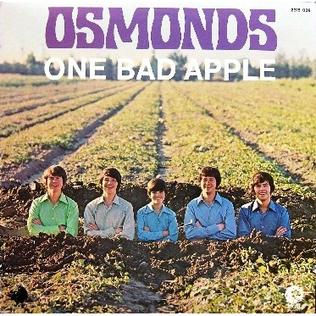
"One Bad Apple" was a No. 1 hit single released by The Osmonds on November 14, 1970. It debuted on the Billboard Hot 100 on January 2, 1971. It hit the top of the chart on February 13, 1971 and stayed there for five weeks. It also reached No. 6 on the R&B chart. Billboard ranked it as the No. 4 song for 1971. Both "One Bad Apple" and the Donny Osmond-credited single "Sweet and Innocent" are on the 1970 album Osmonds. It was certified Gold by the RIAA on February 4, 1971.

"Soldier of Love" is a 1989 song by American singer Donny Osmond, which became his comeback hit.
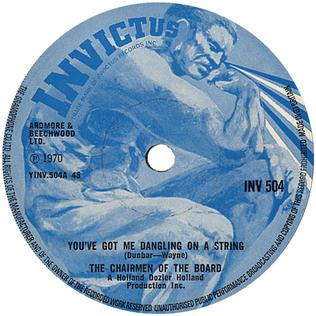
"(You've Got Me) Dangling on a String" is a 1970 soul music song by the Chairmen of the Board. The single reached No. 38 on the US Billboard Hot 100, No. 19 on the US Billboard R&B chart, and No. 5 on the UK Singles Chart. The song was written by Ronald Dunbar and Edythe Wayne.
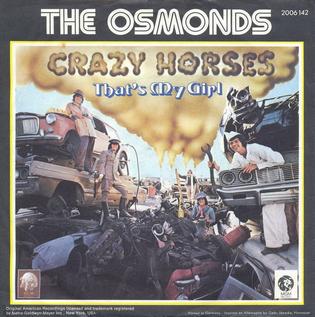
"Crazy Horses" is a 1972 hit single by The Osmonds, the title track from the album of the same name. The song, the only hit record from the Osmonds to feature Jay Osmond as lead vocalist, reached number 14 on the US Billboard Hot 100 and number 2 in the UK Singles Chart. The song has since been covered by numerous other performers.

"Hey Girl" is a song written and composed by Gerry Goffin and Carole King. It first became a popular Top ten hit on the Billboard Hot 100 in August 1963 when recorded by Freddie Scott. Donny Osmond took the song back to the Billboard top ten chart with his cover in 1971.
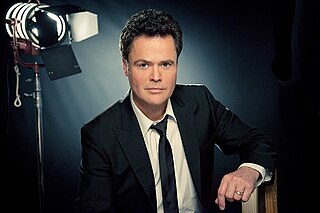
The discography of American pop singer Donny Osmond contains 18 studio albums, nine compilation albums, one live album, four video albums, three extended plays, four music videos, 25 singles and eight additional appearances. After several years collaborating with his siblings' band, The Osmonds, he embarked on a solo career in 1971. His debut single, "Sweet and Innocent," reached number seven on the Billboard Hot 100 and made him a teen pop star. Its follow-up entitled "Go Away Little Girl" topped the same chart in 1971. Also in 1971 his debut studio album was released called The Donny Osmond Album. It peaked at number 13 on the Billboard 200 all-genre chart. His third studio release, Portrait of Donny, reached number six on the Billboard 200 and is his highest-charting album to date. Its two singles became top ten hits on the pop chart: "Hey Girl" and "Puppy Love." He released his fourth studio effort in 1972, Too Young. The record peaked at number 11 on the Billboard 200. It spawned the top 20 pop hits: the title track and "Why." In 1973, Alone Together marked his fifth studio album release and peaked at number 26 in the United States. It spawned his cover of "The Twelfth of Never," which reached number eight on the Hot 100. By the mid 1970s, Osmond reached adulthood adulthood and his career began to decline despite collaborations with his sister, Marie Osmond. In 1976, he recorded an album of disco, which only reached number 145 on the Billboard 200.

The Donny Osmond Album is the debut album by pop singer Donny Osmond. It was released in 1971 on MGM when Osmond was 13 years of age. It was produced by Rick Hall, who was also responsible for most of the arrangements.

"I Knew You When" is a song written and composed by Joe South. It became a popular hit in 1965 when recorded by American pop and country singer Billy Joe Royal. There have also been several other hit cover versions of this song, including by Donny Osmond and Linda Ronstadt.

"Let Me In" is a song written by Alan Osmond, Merrill Osmond, and Wayne Osmond and performed by The Osmonds. It was featured on their 1973 album, The Plan. The song was produced by Alan Osmond.

The discography of American pop duo Donny and Marie Osmond contains seven studio albums, four compilation albums, one soundtrack album, one live album and 12 singles. Both siblings had previously had successful solo music careers before first collaborating in 1974; Donny was also a member of his brothers' band, The Osmonds. Their first single, "I'm Leaving It Up to You," reached number four on the Billboard Hot 100. Their corresponding debut album of the same name peaked at number 35 on the Billboard 200 chart in November 1974. The release certified gold in the United States for sales beyond 500,000 copies. Together, the duo had two more hits that reached both the top ten and 20 of the Hot 100: "Deep Purple" and "Morning Side of the Mountain."
References
- 1 2 3 4 "Breeze On By". MusicVF. 2004. Retrieved 2022-03-13.
- 1 2 Soergel, Brian (2005-01-18). "SONG OF THE WEEK: DONNY OSMOND –"BREEZE ON BY"". Smooth Vibes. Archived from the original on 5 September 2015. Retrieved 2022-03-13.
- ↑ "Donny Osmond". BBC. 2004-12-06. Retrieved 2022-03-13.
- ↑ "Donny Osmond has Top 10 hit after 30 years". UPI. 2004-09-27. Retrieved 2022-03-13.